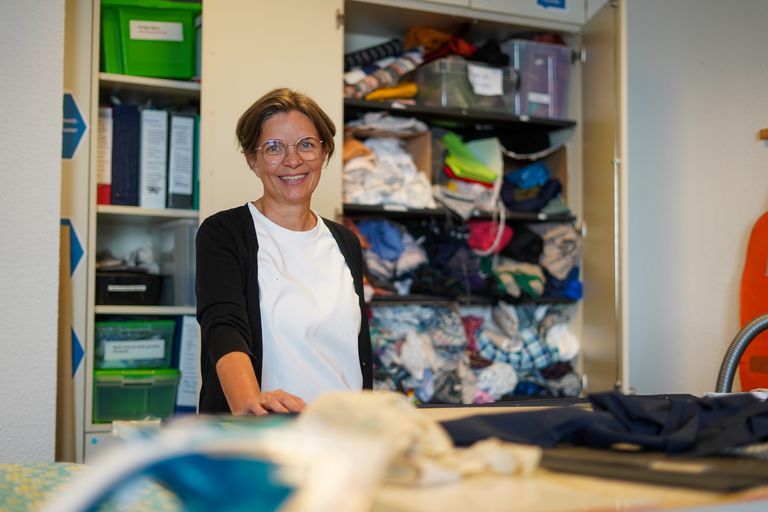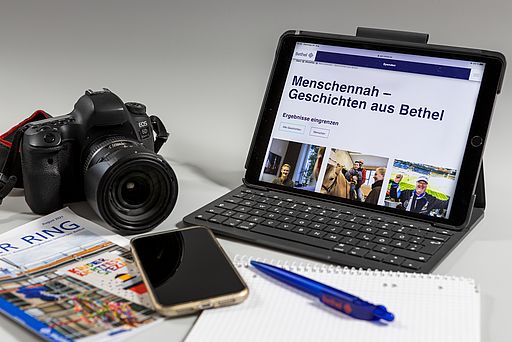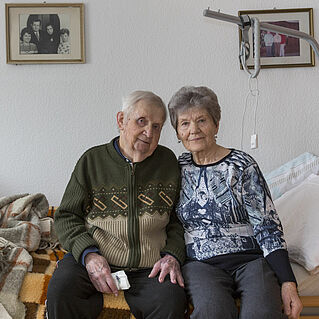
Close to people | Stories from Bethel
Career change from the fashion industry
What does a directrice actually do? "Most people think I'm a director," says Anke Burre and laughs. Her job description, which ultimately led her to Bethel, certainly has nothing to do with the film business. "I design patterns," is her short form for a profession that is located between design and production in textile production. She did this for 35 years until she moved to Tagwerk in Bielefeld-Bethel in December 2022.
Here, in a day-care programme for people with mental illness run by Bethel.regional, she now supervises a sewing group. Anke Burre has thus remained true to creative textile work. Nevertheless, her current activities have little in common with her previous professional life. "I wouldn't want to work in the fashion industry now," she says looking back.
And yet it was once her dream job. In the past. After completing an apprenticeship as a tailor and graduating from high school, she studied fashion design in Düsseldorf. Even then, she realised that she was definitely creative, but that she was even better at "designing". In concrete terms, this means: "I can quickly imagine something and then realise it technically," is how she describes her strength. This talent eventually turned into a profession: "The ideas come from the designer, I develop the patterns, which are then realised by a seamstress," she says, describing the division of labour typical of the industry. She initially developed these patterns on paper, later using a CAD program.

"Everyone is passionate about it, both clients and colleagues."
She started her professional career in Bielefeld, which took her to various fashion companies. Her day-to-day work also involved travelling abroad. After all, she had to check the quality of ongoing production, for example in China, India and Bangladesh. She has extensive professional experience, but many things are new to her at Bethel: "I now know the people here really well. But I'm not a professional in social work," she realises. She has never trained in this field. But also because her colleagues supported her, she never felt out of place. On the contrary: "I get a lot of positive feedback here," says Anke Burre.
That wasn't always the case in the past: "The fashion industry is very superficial. Everyone just has to function. It was all about clothes, not about people." That's exactly what's different at Bethel. At Tagwerk, she realises how different not only the working conditions are, but above all the way people treat each other. "Everyone is committed, both clients and colleagues," she says. When she was still "the new girl", the clients were somewhat reserved towards her - "but always open and positive!" Of course, the new role also harbours challenges: "When clients go through a difficult phase, it really gets to me. You grow together on a daily basis." Nevertheless, she is happy with her new role: "To be given such an opportunity as a career changer is great."
Every day is different. "We don't produce 'off the production line'. I think about what we're going to do in the morning. But things usually turn out quite differently." After all, the clients should be able to develop creatively at Tagwerk. "Many bring their own ideas. I then support them in realising them and make sure that the activity fits and that no one is frustrated." Nevertheless, she has realised: "Sometimes you just have to let people do it."
Text: Robert Burg | Picture: Matthias Cremer
This story simply told
Anke Burre used to work in the fashion industry. After 35 years, she switched to social work at Bethel. Today, she accompanies a sewing group at Tagwerk, a programme for people with mental illnesses. She particularly likes the dedication and respectful treatment there.
Would you like to find out more?
Contact
Bethel.regional
Tagwerk day care centre, TAZ-In
Herbergsweg 10
33617 Bielefeld
Offers & services
The programme is aimed at people with mental impairments, addictions or people in particular social difficulties. The aim is to stabilise and improve their ability to cope with everyday life and shape their personal social situation, to compensate for performance restrictions and to reduce stress caused by the social environment.









